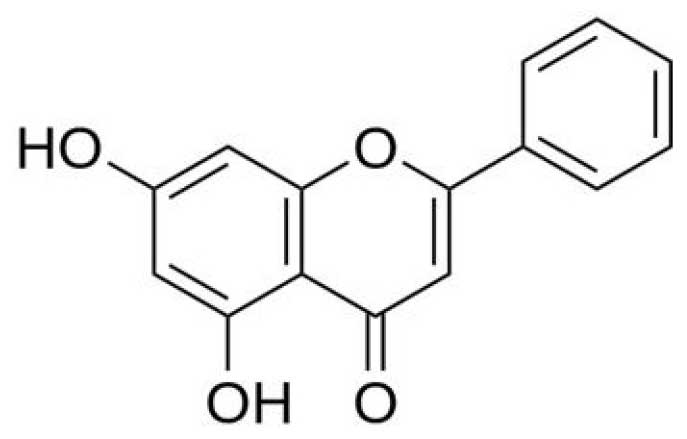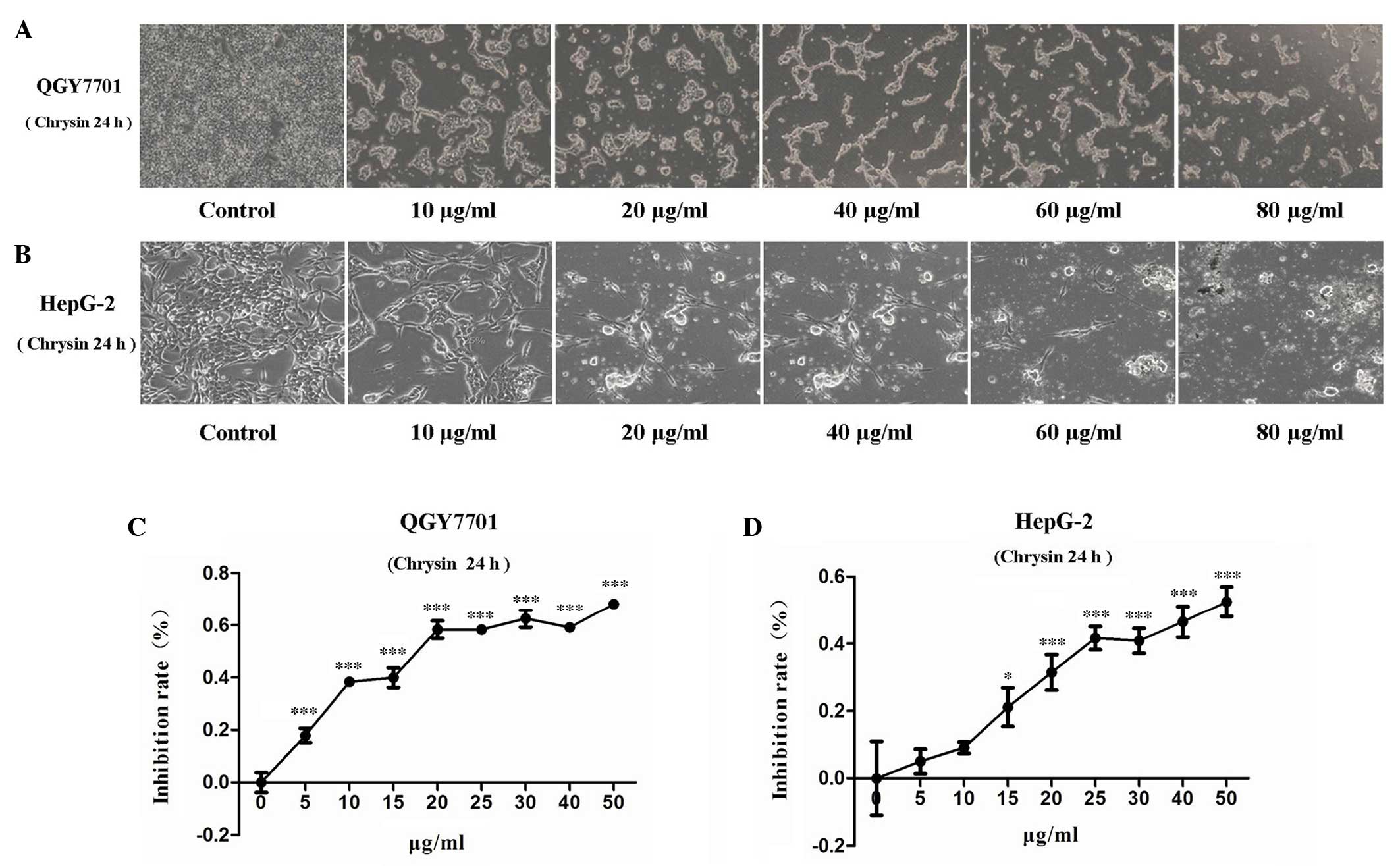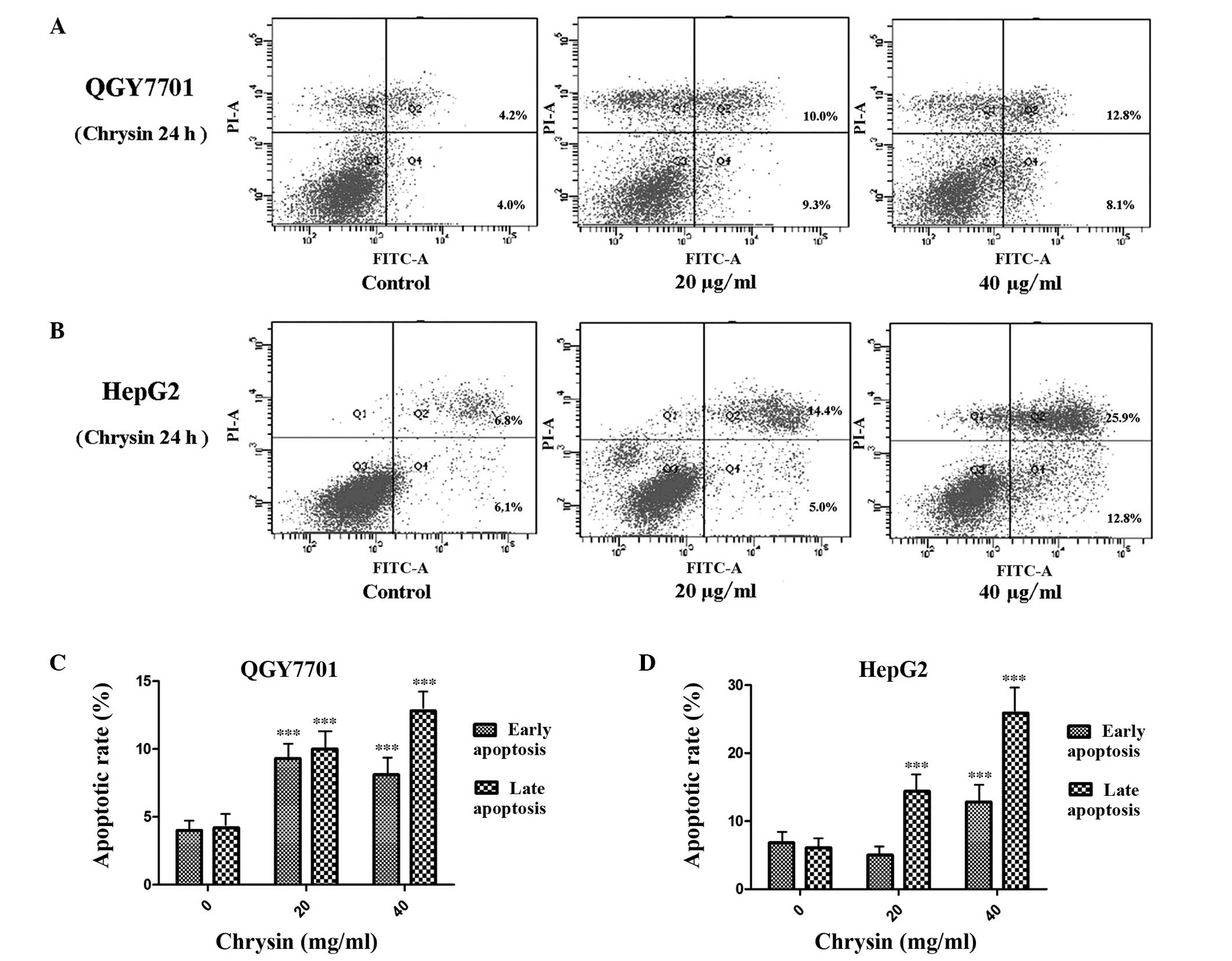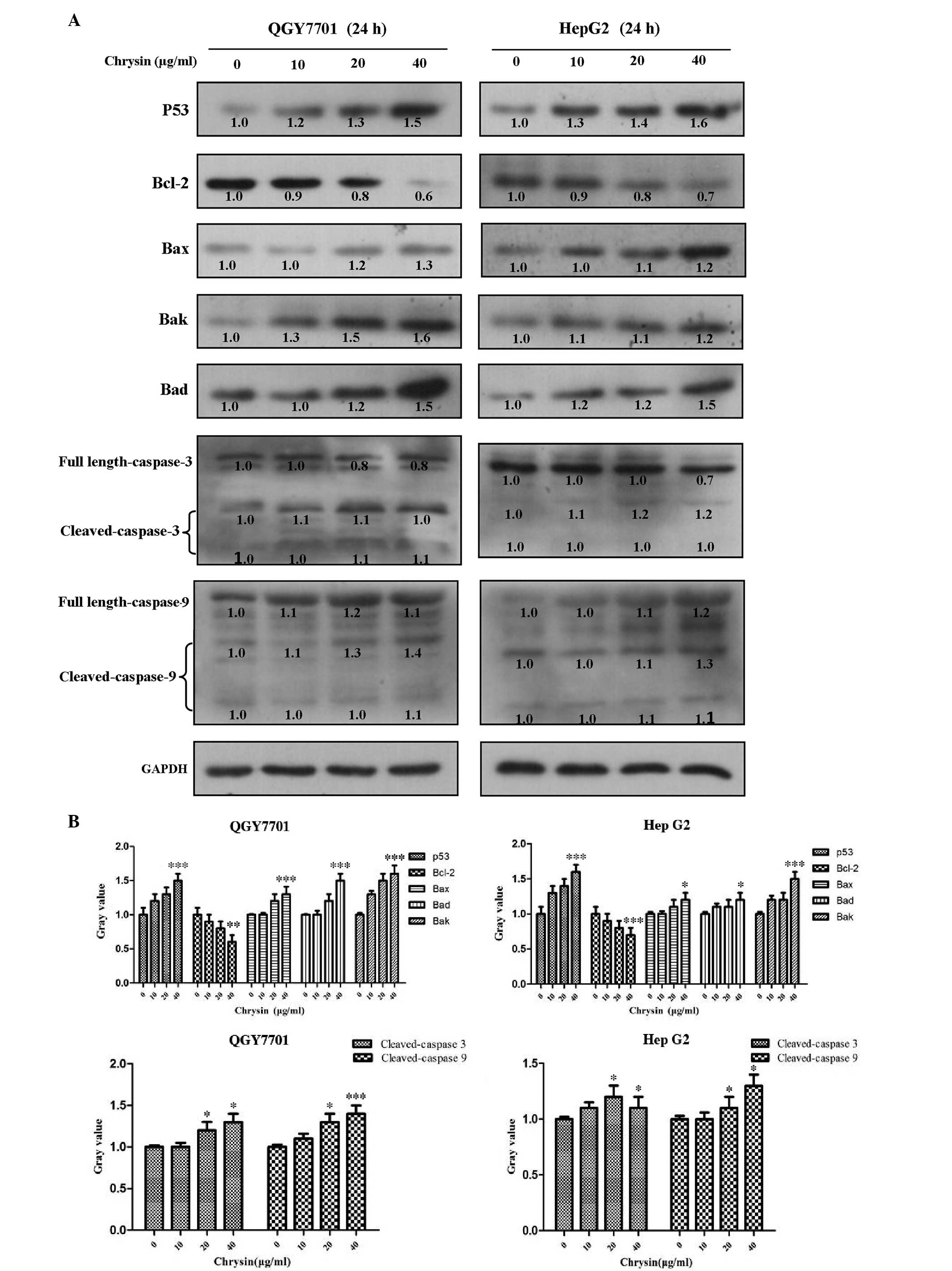|
1
|
Jemal A, Bray F, Center MM, Ferlay J, Ward
E and Forman D: Global cancer statistics. CA Cancer J Clin.
61:69–90. 2011. View Article : Google Scholar : PubMed/NCBI
|
|
2
|
Forner A, Llovet JM and Bruix J:
Hepatocellular carcinoma. Lancet. 379:1245–1255. 2012. View Article : Google Scholar : PubMed/NCBI
|
|
3
|
Au JS and Frenette CT: Management of
hepatocellular carcinoma: Current status and future directions. Gut
Liver. 9:437–448. 2015. View
Article : Google Scholar : PubMed/NCBI
|
|
4
|
Fitzmorris P, Shoreibah M, Anand BS and
Singal AK: Management of hepatocellular carcinoma. J Cancer Res
Clin Oncol. 141:861–876. 2015. View Article : Google Scholar : PubMed/NCBI
|
|
5
|
Manfredi JJ and Horwitz SB: Taxol: An
antimitotic agent with a new mechanism of action. Pharmacol Ther.
25:83–125. 1984. View Article : Google Scholar : PubMed/NCBI
|
|
6
|
Pichichero E, Cicconi R, Mattei M, Muzi MG
and Canini A: Acacia honey and chrysin reduce proliferation of
melanoma cells through alterations in cell cycle progression. Int J
Oncol. 37:973–981. 2010.PubMed/NCBI
|
|
7
|
Barbarić M, Mišković K, Bojić M, Lončar
MB, Smolčić-Bubalo A, Debeljak Z and Medić-Šarić M: Chemical
composition of the ethanolic propolis extracts and its effect on
HeLa cells. J Ethnopharmacol. 135:772–778. 2011. View Article : Google Scholar : PubMed/NCBI
|
|
8
|
Khan R, Khan AQ, Qamar W, Lateef A, Tahir
M, Rehman MU, Ali F and Sultana S: Chrysin protects against
cisplatin-induced colon toxicity via amelioration of oxidative
stress and apoptosis: Probable role of p38MAPK and p53. Toxicol
Appl Pharmacol. 258:315–329. 2012. View Article : Google Scholar : PubMed/NCBI
|
|
9
|
Cherkaoui-Tangi K, Lachkar M, Wibo M,
Morel N, Gilani AH and Lyoussi B: Pharmacological studies on
hypotensive, diuretic and vasodilator activities of chrysin
glucoside from Calycotome villosa in rats. Phytother Res.
22:356–361. 2008. View
Article : Google Scholar : PubMed/NCBI
|
|
10
|
Song MY, Jeong GS, Kwon KB, Ka SO, Jang
HY, Park JW, Kim YC and Park BH: Sulfuretin protects against
cytokine-induced beta-cell damage and prevents
streptozotocin-induced diabetes. Exp Mol Med. 42:628–638. 2010.
View Article : Google Scholar : PubMed/NCBI
|
|
11
|
Tahir M and Sultana S: Chrysin modulates
ethanol metabolism in Wistar rats: A promising role against organ
toxicities. Alcohol Alcohol. 46:383–392. 2011. View Article : Google Scholar : PubMed/NCBI
|
|
12
|
Yang F, Jin H, Pi J, Jiang JH, Liu L, Bai
HH, Yang PH and Cai JY: Anti-tumor activity evaluation of novel
chrysin-organogermanium (IV) complex in MCF-7 cell. Bioorg Med Chem
Lett. 23:5544–5551. 2013. View Article : Google Scholar : PubMed/NCBI
|
|
13
|
Wen S, Zhu D and Huang P: Targeting cancer
cell mitochondria as a therapeutic approach. Future Med Chem.
5:53–67. 2013. View Article : Google Scholar : PubMed/NCBI
|
|
14
|
Brunelle JK and Letai A: Control of
mitochondrial apoptosis by the Bcl-2 family. J Cell Sci.
122:437–441. 2009. View Article : Google Scholar : PubMed/NCBI
|
|
15
|
Mu R, Lu N, Wang J, Yin Y, Ding Y, Zhang
X, Gui H, Sun Q, et al: An oxidative analogue of gambogic
acid-induced apoptosis of human hepatocellular carcinoma cell line
HepG2 is involved in its anticancer activity in vitro. Eur J
Cancer Prev. 19:61–67. 2010. View Article : Google Scholar : PubMed/NCBI
|
|
16
|
Alenzi FQ, Alenazi BQ, Al-Anazy FH,
Mubaraki AM, Salem ML, Al-Jabri AA, Lotfy M, Bamaga MS, Alrabia MW
and Wyse RK: The role of caspase activation and mitochondrial
depolarisation in cultured human apoptotic eosinophils. Saudi J
Biol Sci. 17:29–36. 2010. View Article : Google Scholar : PubMed/NCBI
|
|
17
|
Wolf BB, Schuler M, Echeverri F and Green
DR: Caspase-3 is the primary activator of apoptotic DNA
fragmentation via DNA fragmentation factor-45/inhibitor of
caspase-activated DNase inactivation. J Biol Chem. 274:30651–30656.
1999. View Article : Google Scholar : PubMed/NCBI
|
|
18
|
Fan TJ, Han LH, Cong RS and Liang J:
Caspase family proteases and apoptosis. Acta Biochim Biophys Sin
(Shanghai). 37:719–727. 2005. View Article : Google Scholar : PubMed/NCBI
|
|
19
|
Ling Y, Lu N, Gao Y, Chen Y, Wang S, Yang
Y and Guo Q: Endostar induces apoptotic effects in HUVECs through
activation of caspase-3 and decrease of Bcl-2. Anticancer Res.
29:411–417. 2009.PubMed/NCBI
|
|
20
|
Slee EA, Adrain C and Martin SJ:
Executioner caspase-3, −6, and −7 perform distinct, non-redundant
roles during the demolition phase of apoptosis. J Biol Chem.
276:7320–7326. 2001. View Article : Google Scholar : PubMed/NCBI
|
|
21
|
Cheng EH, Wei MC, Weiler S, Flavell RA,
Mak TW, Lindsten T and Korsmeyer SJ: Bcl-2, Bcl-X(L) sequester BH3
domain-only molecules preventing BAX and BAK-mediated mitochondrial
apoptosis. Mol Cell. 8:705–711. 2001. View Article : Google Scholar : PubMed/NCBI
|
|
22
|
Degenhardt K, Chen G, Lindsten T and White
E: BAX and BAK mediate p53 independent suppression of
tumorigenesis. Cancer Cell. 2:193–203. 2002. View Article : Google Scholar : PubMed/NCBI
|
|
23
|
Liu J, Shu Y, Zhang Q, Liu B, Xia J, Qiu
M, Miao H, Li M and Zhu R: Dihydromyricetin induces apoptosis and
inhibits proliferation in hepatocellular carcinoma cells. Oncol
Lett. 8:1645–1651. 2014.PubMed/NCBI
|
|
24
|
Henry H, Thomas A, Shen Y and White E:
Regulation of the mitochondrial checkpoint in p53 mediated
apoptosis confers resistance to cell death. Oncogene. 21:748–760.
2002. View Article : Google Scholar : PubMed/NCBI
|


















